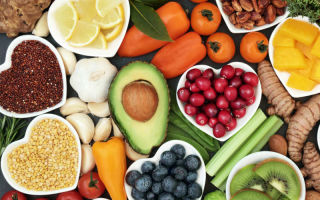Content
- 1 What are food antioxidants?
- 2 The benefits of foods containing antioxidants
- 3 Harm of foods containing antioxidants
- 4 What foods contain antioxidants
- 5 Contraindications to foods with antioxidants
- 6 Table of foods high in antioxidants
- 7 Rules for the use of foods with antioxidants
- 8 Useful Tips
- 9 Conclusion
Foods containing antioxidants are beneficial for the immune system and long-term preservation of youth. To properly formulate a diet, you need to figure out what these substances are, and where they are most present.
What are food antioxidants?
Antioxidants are vitamins, organic acids and enzymes that slow down oxidative processes. Throughout a person's life, the body is forced to fight free radicals - oxidants that lead healthy cells to rapid aging and death. The activity of free radicals provokes the development of diseases, including cancer, and antioxidants prevent destructive processes.
Antioxidant substances are usually divided into 2 groups:
- enzymatic - those that are independently produced by the human body;
- non-enzymatic, or supplied with food.
Natural antioxidants in foods are vitamins, minerals and organic acids. The most famous of them are:
- ascorbic acid and beta-carotene;
- vitamin E;
- tannins and anthocyanins;
- polyphenols;
- lycopene and lutein;
- selenium and zinc;
- copper, chromium and manganese.
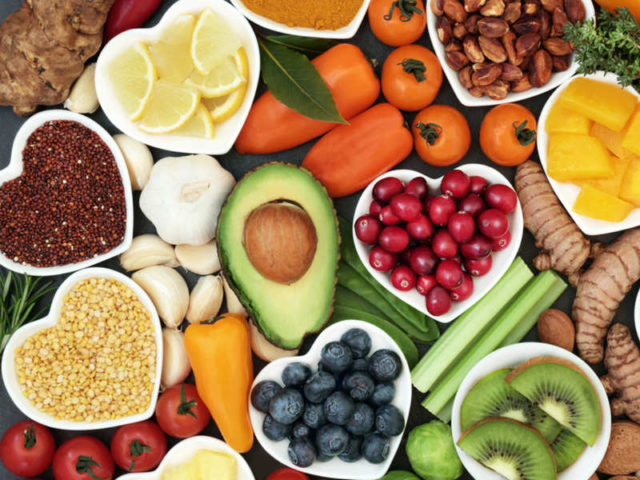
Consuming antioxidants with food is vital. Enzymatic substances can only deal with a small amount of free radicals. In many diseases, the internal strength of the body is no longer enough, and additional antioxidants from food are required.
The benefits of foods containing antioxidants
Foods with antioxidant substances have a very beneficial effect on the body. In particular:
- slow down the aging process and help prolong life;
- hinder the development of oncological processes;
- protect against the development of Alzheimer's disease;
- equalize blood sugar levels and prevent diabetes;
- neutralize the negative impact of bad ecology;
- improve the condition of the skin and help to maintain its smoothness and elasticity for longer;
- activate metabolic processes and allow you to maintain a healthy weight.
To get enough antioxidants, you need to closely monitor the daily dosage of vitamins and other beneficial compounds. In particular, it is recommended to receive at least 70 mg of ascorbic acid per day, 5 mg of lycopene, lutein and beta-carotene, 50 mg of anthocyanins and 200 mg of tannins.
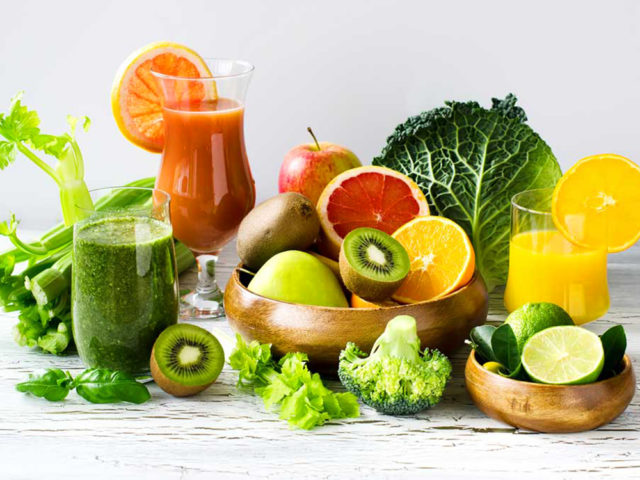
Harm of foods containing antioxidants
In some cases, the strongest antioxidants in foods can be harmful. Side effects from their use occur with an excess of tannins, vitamins and anthocyanins. An overdose of healthy foods can cause:
- deterioration of blood clotting and a tendency to bleed;
- drops in blood pressure;
- digestive disorders - gastritis and stomach ulcers;
- development of autoimmune processes in the body;
- poor absorption of minerals and trace elements;
- deposition of salts in the joints and kidneys.
With caution in the use of products with antioxidant properties, it is recommended to approach smokers and those who suffer from thyroid diseases and rheumatoid arthritis. A large amount of antioxidants can contribute to a deterioration in health and the start of cancer processes.
What foods contain antioxidants
You don't have to buy vitamin supplements from the pharmacy to get enough antioxidants. You can pay attention to food products that contain the maximum amount of valuable substances.
Chocolate
Natural dark chocolate contains a high amount of cocoa powder, and it, in turn, contains tannins - up to 15 mmol / L in a bar per 100 g. Therefore, dark chocolate is good for health, it helps to fight oxidation processes, lowers blood pressure and is allowed to use even on a diet.

Nuts
Antioxidant compounds are found in all types of nuts - walnuts, pine nuts, Brazilian nuts, peanuts and pistachios. Pecan nuts are especially rich in tannins.
Nuts contain amino acids necessary for normal protein synthesis and vitamin E, which is valuable for the skin. They also contain coenzyme Q10, a very valuable anti-aging substance.
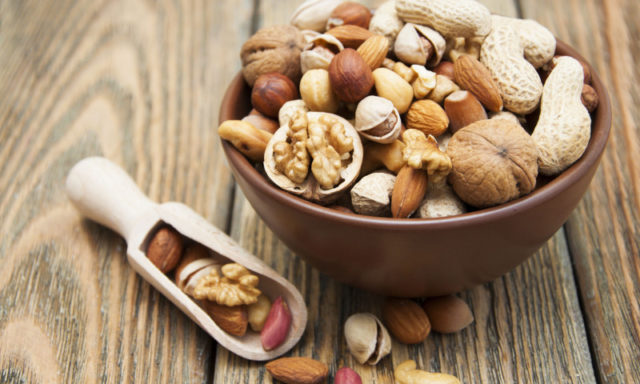
Berries
To prolong the youth of the body, it is useful to consume berries, they are one of the best foods with antioxidants. Particular attention should be paid to:
- for blueberries, it contains flavonoids, vitamins C, A and E, the product effectively fights free radicals and also strengthens vision and blood vessels;
- for strawberries, red berries contain anthocyanins, vitamins C and E, strawberries protect cells from oxidation, and also helps to reduce bad blood cholesterol;
- for raspberries - there are few flavonoids and anthocyanins in it, but there is a large amount of vitamin C and tannins, which makes the berries a very valuable antiviral agent.
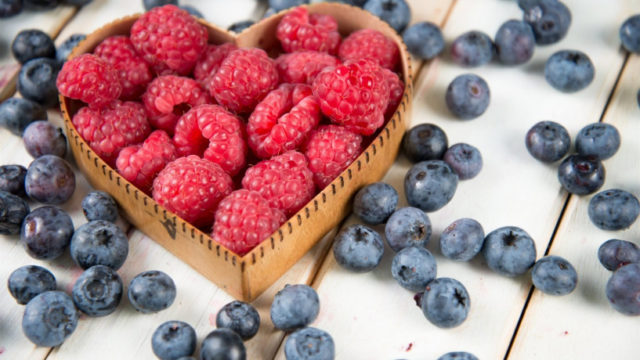
The best sources of antioxidants are red berries; the brighter the fruit, the more valuable substances they contain.
Vegetables
Natural antioxidants in foods can be obtained from vegetables. For example, many antioxidant substances contain:
- red cabbage, the vegetable contains ascorbic acid, as well as antacids, which strengthen blood vessels and reduce the likelihood of blood clots and cholesterol plaques;
- beets - the composition contains the antioxidant betaine, which rejuvenates the body, and also has an analgesic and anti-inflammatory effect in case of joint diseases;
- artichokes, the product contains copper, selenium and zinc, vitamins C and B, and the coarse fiber in them additionally contributes to the removal of toxins and toxins from the body.
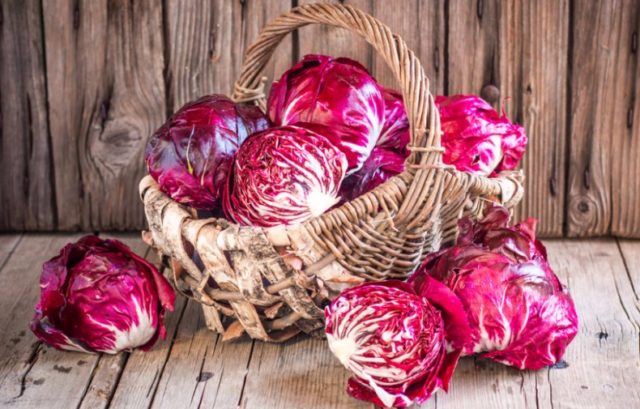
Vegetables are best consumed fresh; steaming or boiling for a short time is also allowed. But when frying and canning, most of the antioxidants in vegetable products are destroyed.
Mushrooms and legumes
Mushrooms, especially porcini, are a good source of antioxidants. They contain not only copper, manganese and selenium, but also a lot of chromium, zinc, vitamins C and B, and the antioxidant ergotineine. Regular consumption of mushrooms helps maintain healthy skin and protect against aging.
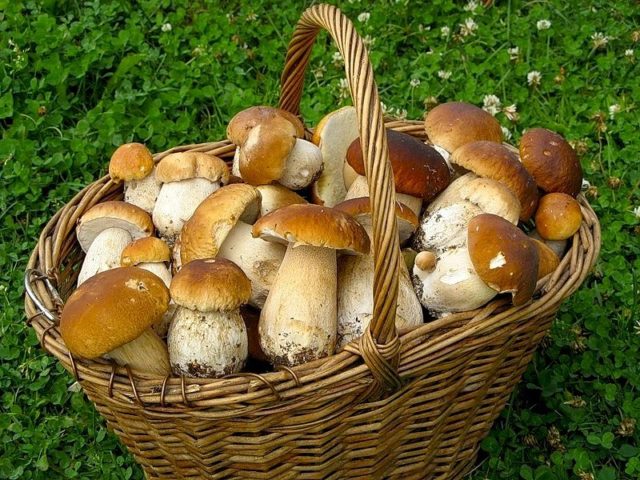
Foods that are rich in antioxidants and help improve metabolism include legumes. Beans, peas and lentils fight oxidative stress and improve bowel function. They contain a lot of ascorbic acid and vitamin A, manganese, zinc and selenium, chromium and molybdenum are present. Legumes reduce the risk of developing cancer.
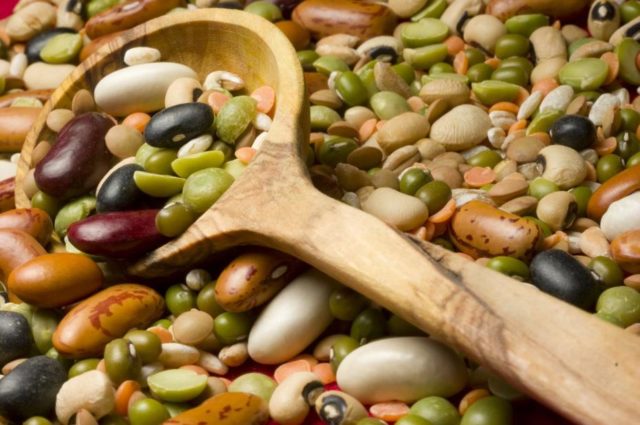
Contraindications to foods with antioxidants
Since antioxidants can be not only beneficial, but also harmful, contraindications should be kept in mind when using the appropriate products. It is not recommended to overuse antioxidant foods:
- with chronic cardiovascular diseases;
- with diabetes;
- with inflammatory ailments of the joints;
- with a tendency to form calculi in the bladder and kidneys;
- with autoimmune diseases;
- with poor blood clotting.
It is necessary to use antioxidants with caution in smoking men and women, vitamins E and A in high dosages in them can lead to the development of oncology.
Table of foods high in antioxidants
It is customary to measure antioxidants in ORAC - special units showing the amount of absorption of oxygen radicals in a particular product. The table gives an idea of the list of the best antioxidants in foods:
|
Products |
ORAC antioxidant content per 100 g |
|
Dried rosemary |
165 280 |
|
Cinnamon |
131 420 |
|
Dried basil |
61 063 |
|
Cocoa powder |
55 653 |
|
White pepper |
40 700 |
|
Paprika |
21 932 |
|
Walnut |
13 541 |
|
Hazelnut |
9 645 |
|
Cranberry |
9 090 |
|
Prunes |
8 059 |
|
Pistachios |
7 675 |
|
Artichoke |
6 552 |
|
Plum |
6 100 |
|
Blueberry |
5 905 |
|
Garlic |
5 708 |
|
Raspberry |
5 065 |
|
Blueberry |
4 669 |
|
Garnet |
4 479 |
|
Peanut |
3 166 |
|
Broccoli |
3 083 |
|
Apples |
2 589 |
|
Oranges |
2 103 |
|
Cashew nuts |
1 948 |
|
Peach |
1 922 |
|
Grapes |
1 837 |
|
Beet |
1 776 |
|
Radish |
1 750 |
|
Mandarin |
1 627 |
|
Spinach |
1 513 |
|
Brazilian nut |
1 419 |
|
Lemon |
1 346 |
|
Apricot |
1 110 |
|
Eggplant |
932 |
|
Kiwi |
862 |
|
Legumes |
799 |
|
White mushroom |
691 |
|
Celery |
552 |
|
Tomatoes |
546 |
|
White cabbage |
529 |
|
Green tea |
520 |
|
Pumpkin |
483 |
|
Carrot |
436 |
The daily ORAC for an adult is 5,000 units. It should be borne in mind that daily dosages are largely determined by the state of health and the environment and can change both up and down.
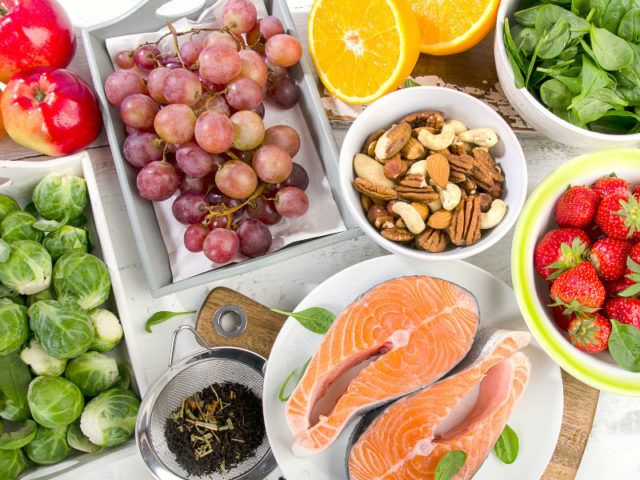
Rules for the use of foods with antioxidants
When consuming foods rich in antioxidants or anti-inflammatory compounds, moderate dosages should be followed. To replenish the level of antioxidants, you should pay attention first of all to citrus fruits, nuts and vegetables. From them, you can get the daily requirement of antioxidant substances, even if the portions of the food are small.
Particular attention should be paid to the preparation of the menu for some diseases:
- With diabetes, it is recommended to get antioxidants primarily from sour apples, citrus fruits and cherries. But bananas, potatoes, persimmons and other foods high in sugars and potassium are best avoided.
- With diseases of the stomach and intestines, you need to eat mainly vegetables after light heat treatment and nuts. Fresh fruits can only be eaten in small quantities, organic acids in their composition can be harmful.
- In psoriasis, the development of which many doctors associate with autoimmune causes, the focus should be on nuts and legumes, as well as the liver.These products contain selenium, which has an antioxidant effect and prevents the proliferation of free radicals.
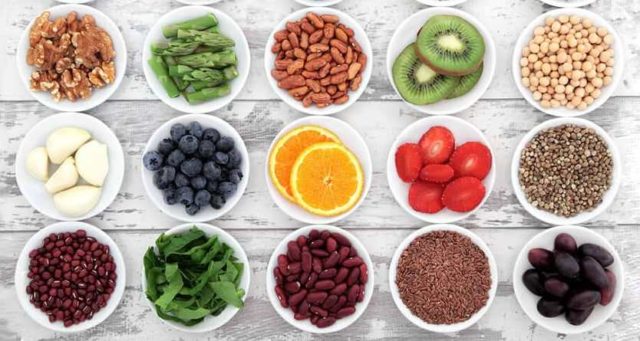
Useful Tips
To maintain the required level of antioxidant compounds in the body, it is recommended to eat 3-4 fruits daily, a handful of nuts or berries. Such products will raise vitality and prevent the development of vitamin deficiency.
Antioxidant-rich fruits and vegetables are best eaten fresh. In boiled, frozen and stewed foods, as well as in fruit desserts, the level of nutrients is always lower, since some of the vitamin compounds are destroyed during processing.
It is recommended to add natural seasonings and spices to main courses and soups. Onions, parsley, celery, ginger and cinnamon also contain antioxidant compounds, whereas flavor enhancers and chemical preservatives do not.
Conclusion
Foods containing antioxidants help to delay aging and protect against dangerous ailments. Antioxidants are easy to obtain and are found in many inexpensive vegetables, fruits, nuts, and legumes.

